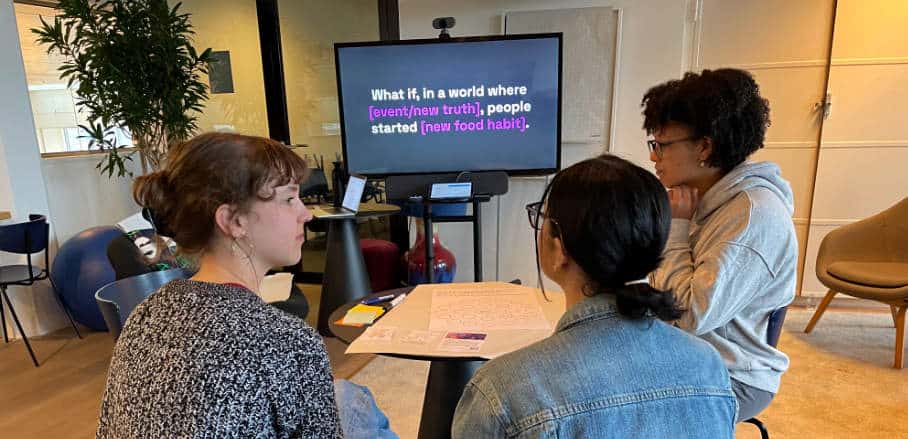Empowering the Next Generation of Urban Changemakers
Young people have fantastic ideas how to create liveable cities of the future – we need an environment that fosters their creativity, says Mario Raimundi Pruss from the Young City Makers Programme.
The year is 2250 and we are in Rotterdam. Noa is a young adult living in the city. His legs don’t work, so everyday he thrives using his jetpack, but it’s frustrating since everything is too chaotic. People still live in buildings and have elevators, but everyone is using jetpacks and there is no place to relax. Robots are doing a lot of work, so people have free time to relax and be calm. Noa wants to break this status quo by creating a place that is accessible to rest, but based on human connections.
So, what if we use our imagination to explore future scenarios and think about what we actually want to bring to the future and what we’d like to avoid? This was the idea behind the Young City Makers programme, giving youth the opportunity to imagine, explore, discover, and dream about the future, tapping into the consequences of our decisions today. The story of Noa is just one of the many stories that youngsters came up with.
This programme can sound like science fiction – actually it has a lot of it –, but could not be more relevant today. The new urban generation is growing up in an increasingly complex world, with increasingly big challenges. Being young in itself is a challenge – been there, done that – but it is particularly tough when your very future is at risk. Climate crisis, economic and social unrest, disinformation, social media creating pressure to fit and belong, and the coronavirus as yet another trigger that had a serious impact on the mental health of our next generation. At the same time, fortunately, young people take the streets or fight for their future in other ways, trying to make their voice heard.
What Is the Real Human Superpower?
But to create real solutions and a better future for all, we need to change our focus. Technology and innovation won’t be enough – a new way of thinking and doing is essential, and this does not happen overnight. Young City Makers is about preparing our future leaders and change-makers, equipping them with the right skills while learning from them how we can collaborate in completely new ways.
“This is so different to school, here we are actually encouraged to explore our ideas instead of killing them!”, was one of the comments we’ve got during the program. If we think about facing an unpredictable world – uncertainty is the new standard –, we need to create the conditions to unleash the real human superpower: creativity. Maybe abstract to many and not very efficient, but robust, as Margaret Heffernan argues. Human creativity, imagination, and collaboration are the skills we really need to be ready for future scenarios we cannot even think about today.
If we review how technological innovations were introduced in the past, you will immediately realise we didn’t think enough of possible consequences – specially the not-so-good ones. The narratives regarding social media and new communication technologies were about democratising public conversations, connecting to our friends and networks, giving everyone access to first-hand information. Our societies would be more active, engaged, and able to make better decisions. But nobody thought about disinformation manipulating public opinion, algorithms reinforcing our biases and creating polarisation, or the pressures to fit in a world where everyone seems happy. Mental health issues of youngsters worldwide are on the rise, posing a serious threat to our capacity to build a better place for all.
We urgently need to change the focus of education, thinking about it as climate control, a creation of the environment needed for human creativity to thrive.
How Can We Empower Young People to Become Young City Makers?
In my experience of working with youth, there is something very clear: they don’t appreciate condescension. So, if our idea of actively listening and empowering our youngsters is only saying, “Yes, you should be angry since the future is already decided”, we are not doing them any favours. Worst of all, we won’t make any progress on the issues we need to resolve. We should be able to propose to them more than just kicking an open door again and again.
A better approach would be to help them to deal with their emotions, developing emotional intelligence, fostering collaboration and imagination, experiment and try new ideas, giving them tools to understand systemic problems of how we can drive change and accelerate transitions, and making the big picture visible. Yes, we have a lot to deal with, but we are also better equipped. We have science, data, technology, and knowledge. But we depend on our human capacities to create, imagine, and work together. All these need a spark of hope, trust, and even faith in the potential to do great things.
We need to create platforms for inter-generational collaboration where youngsters can truly become agents of change by taking action, driven not by fear and urgency but by cool-headed analysis. The future hasn’t happened yet, and we can help youngsters to shape it together and to become the city makers we need.
- Empowering the Next Generation of Urban Changemakers - 19. August 2022
